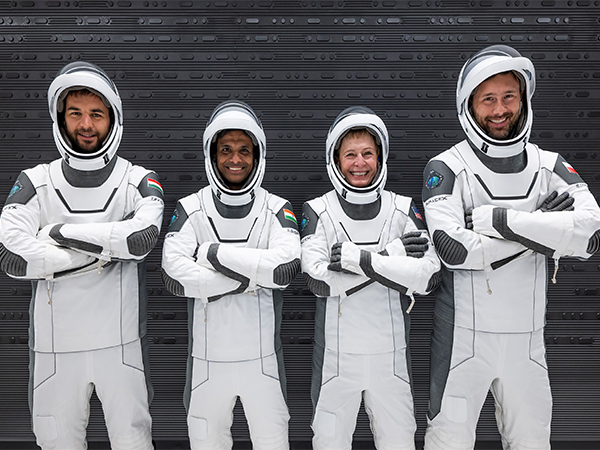
Florida: SpaceX has said that the Axiom-4 mission crew is ready for launch to the International Space Station as the Dragon's hatch has closed and all communication and suit checks have been completed.
"Dragon's hatch is closed, all communication and suit checks are complete, the seats are rotated, and the Ax-4 crew is ready for launch," SpaceX posted on X.
NASA, Axiom Space, and SpaceX are targeting 2:31 am EDT, Wednesday (Noon IST), June 25, for launch of the fourth private astronaut mission to the International Space Station, Axiom 4.
The mission will lift off from Launch Complex 39A at NASA's Kennedy Space Centre in Florida. The crew will travel to the orbiting laboratory on a new SpaceX Dragon spacecraft after launching on the company's Falcon 9 rocket. The targeted docking time is approximately 7 am on Thursday, June 26.
Indian Air Force Group Captain Shubhanshu Shukla is set to pilot the Axiom-4 mission. Joining the mission are Slawosz Uznanski of Poland, a European Space Agency (ESA) project astronaut, and Tibor Kapu of Hungary. Uznanski will be Poland's second astronaut since 1978, while Kapu will be Hungary's second since 1980. Veteran American astronaut Peggy Whitson will command the mission, adding to her record for the longest cumulative time spent in space by any American.
NASA had earlier stood down from a proposed launch date of June 22. According to the ISS, additional time is needed to evaluate station operations following recent repair work in the aft segment of the Zvezda service module. Due to the highly interconnected nature of the orbital laboratory's systems, NASA is reviewing relevant data to ensure readiness for the arrival of additional crew members.
Highlighting the global significance of the mission, ISS noted that the agencies "appreciate the historic nature of this mission for the nations of India, Poland, and Hungary, as well as the world." The four-member crew remains in quarantine in Florida and is prepared to launch once the station is cleared to receive them. Axiom Mission 4 will be commanded by Peggy Whitson, a former NASA astronaut and now Axiom Space's Director of Human Spaceflight. Indian astronaut Shubhanshu Shukla from ISRO will serve as the mission's pilot.
The mission specialists are ESA project astronaut Slawosz Uznanski-Wisniewski from Poland and Tibor Kapu from Hungary. SpaceX's Falcon 9 rocket and Dragon spacecraft remain healthy on the launch pad at Launch Complex 39A at NASA's Kennedy Space Centre in Florida.
According to Axiom Space, the Ax-4 mission will "realise the return" to human spaceflight for India, Poland, and Hungary, marking each nation's first government-sponsored flight in more than 40 years.
While this is the second human spaceflight mission in history for these countries, it will be the first time all three will execute a mission aboard the International Space Station. This historic mission highlights how Axiom Space is redefining access to low-Earth orbit and elevating national space programs globally.
Axiom-4 will be the second commercial spaceflight mission made up of government and ESA-sponsored national astronauts. The Ax-4 mission stands as a beacon of opportunity for India, Poland, and Hungary, each poised to leverage this mission to advance their national space programs.
The Ax-4 research complement includes around 60 scientific studies and activities representing 31 countries, including the US, India, Poland, Hungary, Saudi Arabia, Brazil, Nigeria, UAE, and nations across Europe. This will be the most research and science-related activities conducted on an Axiom Space mission aboard the International Space Station to date, underscoring the mission's global significance and collaborative nature to advance microgravity research in low-Earth orbit (LEO), per Axiom Space.
The mission emphasises scientific portfolios led by the US, India, Poland (in partnership with ESA), and Hungary. It aims to boost participation in these countries by involving diverse stakeholders, showcasing the value of microgravity research, and fostering international collaboration. The studies will enhance global knowledge in human research, Earth observation, and life, biological, and material sciences, demonstrating the space research capabilities of the crew's home nations.